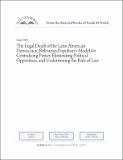| dc.description.abstract |
Over the past decade, Hugo Chavez has remade the Venezuelan polity into his own image, centralizing power and undermining his rivals. The most striking features of the changes in Venezuelan government is the fact that the changes have been made through ostensibly legal mechanisms; that is, Chavez used Venezuelan democratic institutions to centralize power. Chavez’s blueprint for power-centralization is straightforward: (1) he convened a constitutional constituent assembly to rewrite the previous constitution, (2) he created a doppelganger Congress and Supreme Court, gradually transferring power from the existing Congress and Court to the new institutions, and (3) he dissolved the original Congress and Supreme Court, leaving only his hand-picked versions of the legislature and judiciary. Bolivia’s President Evo Morales and Ecuador’s President Rafael Correa have already begun to copy Chavez’s approach. Democracy supporters must meet this rising authoritarian tide by supporting increased rule of law reform in Latin America. |

